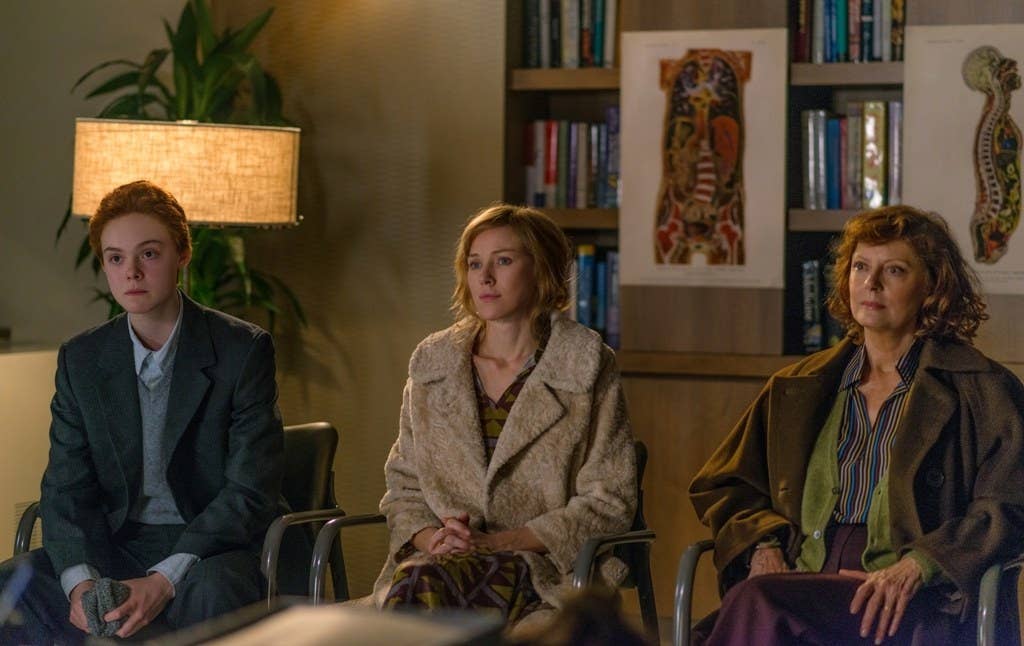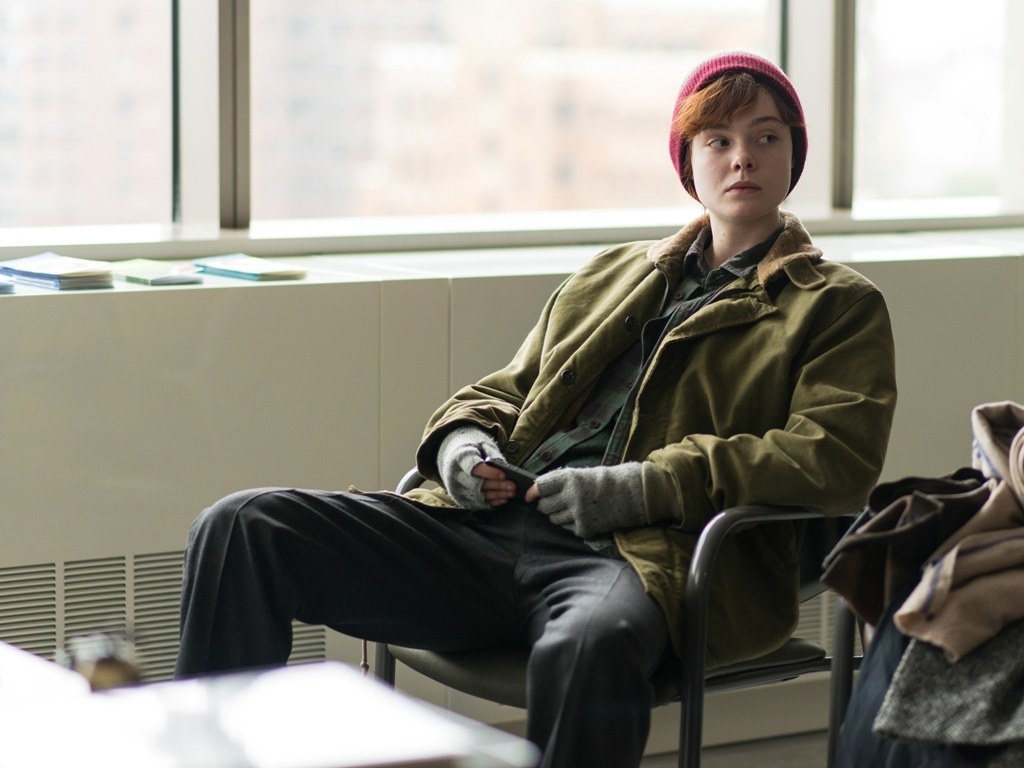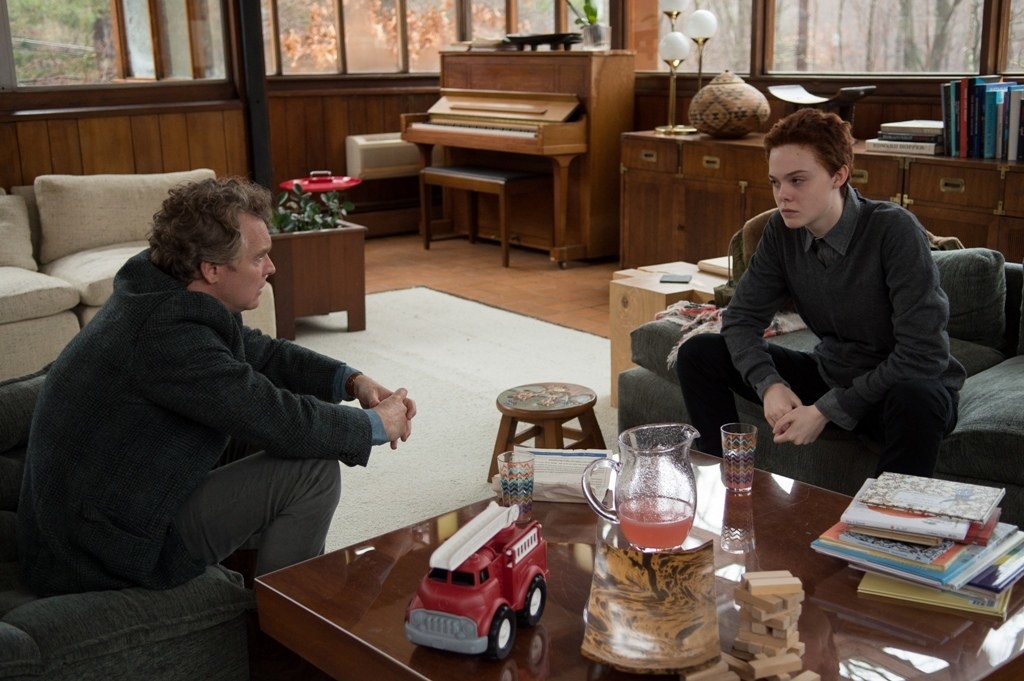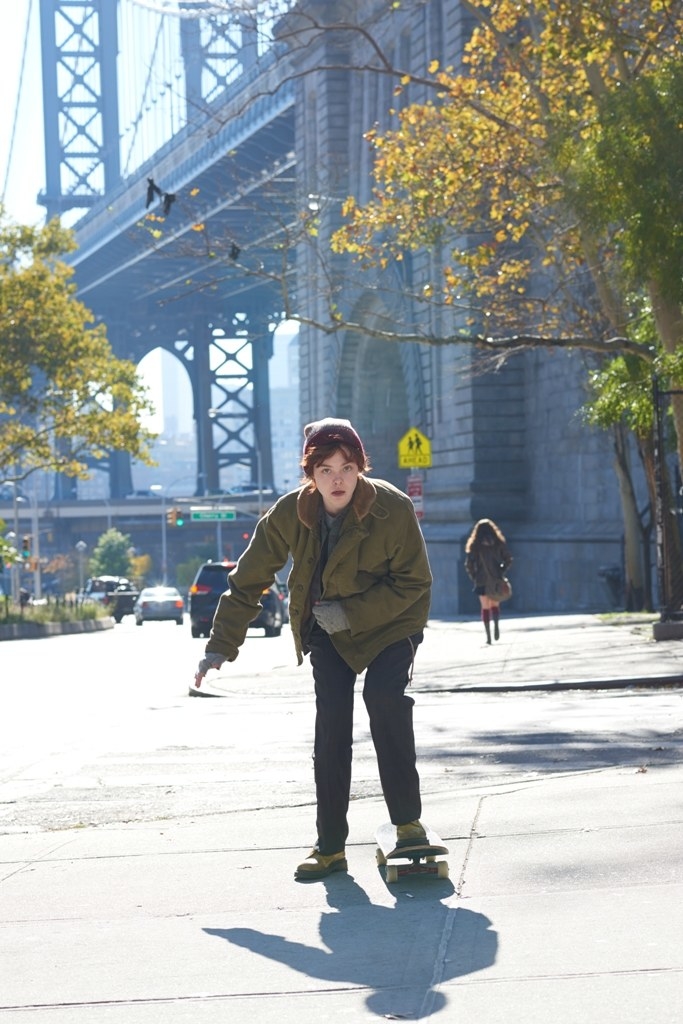
Like Ray in 3 Generations — Gaby Dellal’s controversial new film about a trans boy (Elle Fanning) and his family — I came out to my mom as trans when I was 16. I was scared, confused, and inarticulate. ”We’ll figure it out,” she said.
After the shock subsided, my mom went to the library, a musty, quiet safe haven. She was looking for a book about people like me. That day, my mom checked out a memoir called Just Add Hormones and the 1999 Oscar-winning film Boys Don’t Cry, the only relevant movie she could find in the library's extensive DVD section. She came home, excited and relieved to have something to show me. After she sat down with me on the couch, we waited to see what this whole transgender thing was all about.
But we didn’t make it very far. After the “getting ready” scene — Brandon (Hilary Swank) gets out of the shower, binds his chest tightly with an Ace bandage, then turns to look at himself in the mirror to decide whether to pack with a prosthetic or a rolled up pair of tube socks — my mom turned the TV off. “I don’t want this to be what it’s like for you,” she said, her eyes welling. “That looks like it hurts.”
I laughed. “Don’t worry. Even I know you can’t use Ace bandages to bind.”
That aborted attempt to watch Boys Don’t Cry with my mom showed me that we still need mainstream movies about trans people — even imperfect ones.
In the wake of the so-called transgender revolution, portrayals of transgender people in popular media are still rather rare. Most are Oscar-winning tragedies where the transgender character is played by a cisgender actor and doomed to an untimely demise, like Boys Don’t Cry (the dramatic retelling of the events leading up to the murder of Brandon Teena, a transgender man), Albert Nobbs (inexplicably, Glenn Close plays a transgender butler named Albert Nobbs who dies after sustaining a head injury in a fight), Dallas Buyer’s Club (Jared Leto plays Rayon, an HIV-positive transgender woman, who helps smuggle non-FDA-approved drugs into the US before she dies), and The Danish Girl (Eddie Redmayne is Lili Elbe, the transgender painter and one of the first identifiable recipients of sex reassignment surgery — she, too, dies). Otherwise, we are deceptive villains: Buffalo Bill in Silence of the Lambs; Lois Einhorn in Ace Ventura.
Kids like the one I used to be are turning to outdated and misinformed portrayals when they need to see themselves most.
I was hopeful 3 Generations — which at one point was renamed About Ray before changing back to 3 Generations again — could hit a different note. Much like Mike Mills’ 20th Century Women, in which Elle Fanning also starred, 3 Generations is an intergenerational coming-of-age story involving multiple women of different ages struggling to raise a teenage boy. Only in 3 Generations, the boy is trans. Starring Naomi Watts as Maggie, Ray’s mom, and Susan Sarandon as Dolly, Ray’s zany (and transphobic) grandmother, the movie was slated for a late 2015 opening — but it was pulled just days before its scheduled release date. In the interim, director Gaby Dellal recut the film to “temper the humor a bit,” though the poster still promises “a human comedy for today.” This weekend, it will be quietly released after 18 months in limbo.
From the moment I heard 3 Generations’ opening lines (“Every year I blow out my candles, and make the same wish: ‘I wish I was a boy’”), I was ready to roll my eyes. But I reminded myself that I was watching the film as an adult — as a teenager, that was the kind of reductive one-liner I might have written in my journal.
But then, not long afterward, there is a long, slow shot of Ray staring at himself in the mirror, his chest bound with Ace bandages. Sitting in the dark theater, I was suddenly back on the couch with my mom. Almost two decades after Boys Don’t Cry, cis directors are using the same tropes to portray transmasculine people.
In 2017, we should at least be able to expect a basic level of proficiency and familiarity with trans issues in films about trans people made by cis directors — and 3 Generations misses the mark. These kinds of films don't need to be perfect, because even flawed representations can open up important conversations between families, like Boys Don’t Cry did for me and my mom. Even so, we deserve more than what 3 Generations offers, including the endorsement of desistance myths, providing misinformation about hormone replacement therapy, and treating its trans protagonist as a prop whose job is to help the cisgender characters in the movie to learn and grow. Every missed opportunity to portray a trans person as a fully realized human means that kids like the one I used to be are turning to outdated and misinformed portrayals when they need to see themselves most.

Ray and his mom, Maggie, live in a brownstone in New York City with Maggie’s mom, Dolly, and her girlfriend, Frances, played by Linda Edmond. For Maggie, the goal seems simple enough: Get Ray on testosterone before the next school year so he can transfer schools. But here’s the catch: Both his parents need to sign a form that is required because he is 16 and underage, even though he hasn’t seen his dad in 10 years.
Trans youth face incredible obstacles to access hormone replacement therapy: They have to find a medical provider covered by insurance, get a doctor to agree that the treatment is medically necessary, and pay for hormones if insurance won’t cover it (especially if their parents don’t know about and support their transition). In 3 Generations, Maggie, the custodial parent, consents to Ray starting hormone replacement therapy, and yet is told that she still needs to get consent form Ray’s dad. In a state where minors in real life can access hormones without any parental consent, this is a major stretch, and misinforms parents and kids who might be in the same position. According to the Sylvia Rivera Law Project, transgender youth in New York can always consent to their own health care, including hormones, “when a parent or guardian has refused to give consent and a doctor finds that treatment is necessary and in your best interests" or a "parent or guardian is not reasonably available if the doctor finds that you have capacity and the medications are in [the young person's] best interests.” When trans kids face so many actual obstacles, it's bizarre that 3 Generations presents one that doesn't actually reflect the lived reality of young trans New Yorkers.
For the first half of the movie, it seems as though the dad, Craig, is the one standing between Ray and his hormones. Watts' Maggie bemoans that she is “dealing with this shit for two” because Craig isn’t around. But, we learn as Dolly questions Maggie in their kitchen — while consuming a whole pint of So Delicious coconut milk frozen dessert — that Maggie hasn’t signed the permission forms for Ray’s HRT, and doesn't want to. For the rest of the scene, Maggie and Dolly dither about whether or not the coconut milk frozen dessert is real ice cream. 3 Generations should be nominated for the sloppiest #sponcon Academy Award. They also discuss whether or not Maggie really wants Ray to start testosterone. Maggie tells Dolly that she wants Ray to take his transition slow, because she is worried that one day he “will turn around with a full beard and say, ‘Mom, I made a mistake.’”

At other points in the film, Dolly (who is openly lesbian) says things like, “I fought against female genital mutilation for years, and now I have to call my granddaughter ‘he’?” and “She likes girls and still gets her period … I vote lesbian!”
This happens again and again: Susan Sarandon’s Dolly, the straight-shooting matriarch and easily the most charming character, says something exclusionary and harmful — seemingly as a joke —and no one counters it. As the movie limps on, Maggie starts believing Dolly’s theories: That Ray might just be a lesbian, that Ray is too young, that Ray may want to “change back” his gender. Dolly is easily a TERF, a trans-exclusionary radical feminist. Dolly’s brand of feminism and her sexual politics disenfranchise transgender people by questioning their very existence. TERFs alienate and exclude trans folks — who they believe are “mutilating their bodies” — spread misinformation, and generally base gender identity on physical characteristics as opposed to individual determination. TERF ideology is damaging, to say the least, and given that 3 Generations is a work of total fiction, it’s impossible to defend Dellal’s choice to showcase and give credence to TERF ideology, even though Dolly’s stance does eventually soften.
Maggie changes over the course of the movie, too. Unlike most moms of trans and gender-nonconforming kids I know, she neither outright rejects her son nor dives into a feverish period of confusion and research. Instead, she does watercolor illustrations of woodland creatures (which I guess is her job? This is never explained), and has a one-night stand after which she asks the man if he likes having a penis. Maggie does not seek out other sources or look for support outside of her TERF mom, instead telling Ray to take things slow and saying "I'm proud of you" and making him say it back.
As an example of a parent who cannot be reviled or aspired to, who neither intentionally hurts or actively helps Ray, Maggie is frustrating. By the last 15 minutes of the film, though, Maggie is holding a copy of The Transgender Child and agrees to sign the forms for Ray. Even so, Maggie doesn't do justice to the moms of transgender kids who do their homework.
Ray, the former title character and driving force behind the plot of the film, doesn’t get a lot of active screen time. We see him skateboarding around Long Island City or working out alone on the roof of the family’s brownstone, taping it for a vlog about transitioning. But after his opening voiceover, Ray is more or less a prop — a piece of the set for the other characters to bump up against.
In easily the most cringeworthy moment in a movie full of them, Ray and Maggie lay in bed watching television. Maggie leans over to kiss Ray on the cheek, and Ray rolls away. “That’s so gay,” he says.
“You can’t say that,” Maggie sputters.
“I’m reappropriating it,” Ray says, in a defiant and sullen, jeez, mom tone.
“You can’t reappropriate a word that doesn't apply to you.”
“I’m a boy with tits,” Ray retorts, walking out of the room. “I can reappropriate whatever I want.”

Hearing Elle Fanning say the phrase “a boy with tits” is enough to justify all the flack Dellal got for casting her instead of a trans actor to play Ray. As she explained to BuzzFeed News in an April interview, “I needed to find an actor who was experienced enough to take on this role, who hadn’t transitioned yet, who was a trans man or trans boy. That’s quite a tall order. Unfortunately, I was unable to fill that role.”
Dellal originally set out to make a movie about three generations of women, two of whom would be gay, and later decided that one of them should be trans to make this evergreen plot more timely. That’s probably why the trans character — and arguably the most important character — is the least compelling and the least dynamic.
Some things about Ray as a trans character check out, like running late to class because he needs to use a gender-neutral restroom that’s off school grounds. But for the most part, he falls flat. He’s a composite of teenage hobbies: skateboarding, making beats out of old jazz samples, filming everything he does (which he does as part of an art project and also to vlog his transition). He is prone to emotional outbursts (“I’m not having a shitty day, Mom, I’m having a shitty existence!”) that are without much emotional depth.
Ray does advocate for himself, sometimes. But when he does, it’s with one-liners (“I’m done being an exception!”) or malicious remarks. When Dolly asks him why he wants to transfer schools after he starts hormones, Ray says, smirking, that he “just wants to try it, just like you wanted to try being gay.”
There could be a reason why Ray’s dialogue is riddled with empty clichés. Dellal has said the inspiration for Ray came from running into a father whose child just came out as transgender and she “watched them go through the various moments in their transition as a family, from afar.” The transgender plot in 3 Generations is like a story you hear at a party, and when you try to retell it hungover the next morning, it just doesn't sound quite right.
Ray is ultimately a cis person’s fantasy about the trans experience, checking off every trope on the transmasculine bingo board.
Ray is ultimately a cis person’s fantasy about the trans experience, checking off every trope on the transmasculine bingo board: character gets beat up, character binds with Ace bandages, character has a crush on a girl who rejects him, character changes his name to the masculine version of his given name (i.e., Ramona to Ray), character shaves his head, etc. This should serve as a warning to other cis filmmakers: When you make us incidental plot points instead of headliners, your movie will be forgettable at best, and more likely, harmful and reductive. At the very least, you should not misgender your trans character while doing press for the film.
The movie — which goes off the rails for a while with some family drama unrelated to Ray’s dilemma — does have a happy ending, which at least sets it apart from the many trans tragedies that came before it. Craig and Maggie sign the forms, and Ray starts testosterone. 3 Generations ends as Ray tells Maggie, “I’m proud of you.” I stifled the urge to shout “Why?!”
Back on that day in the living room, after we shut off Boys Don’t Cry, my mom and I put on Ang Lee’s 2005 film, Brokeback Mountain: a classic story about two men who fall in love one summer working as cowboys, who can’t be together because the world keeps them apart. They get together for trips when they can, and after decades, Jake Gyllenhaal’s Jack Twist wants to take a leap of faith: leave their families and start a ranch together. Heath Ledger’s Ennis rejects him, paralyzed by fear. Shortly thereafter, Jack is murdered — but not before he tells Ennis, “I wish I knew how to quit you,” and everyone cries.
My mom and I made popcorn and we felt things: the heartbreak of Jack being gone for good and, with him, the life he and Ennis could have had together. I told my mom that this was why I was transitioning, even if she thought I was too young: so that I wouldn't cry over what my life could have been.
Even though that movie wasn't directly about me, it opened up a conversation for me and my mom — because movies are expressions of our human potential. Brokeback, even if it was yet another gay tragedy, was rooted in the fullness of the queer experience: love and joy, not just pain. And being in the presence of that was enough for my mom and I to open up to each other.
That’s what a great movie can do. Maybe parents and trans kids can open up over 3 Generations, but they deserve a better conversation-starter. In the meantime, trans youth, you and your mom should just watch Moonlight.
